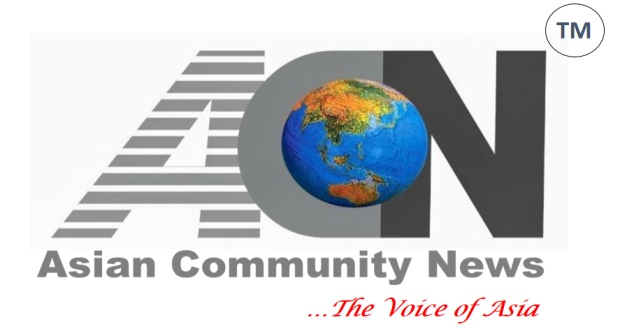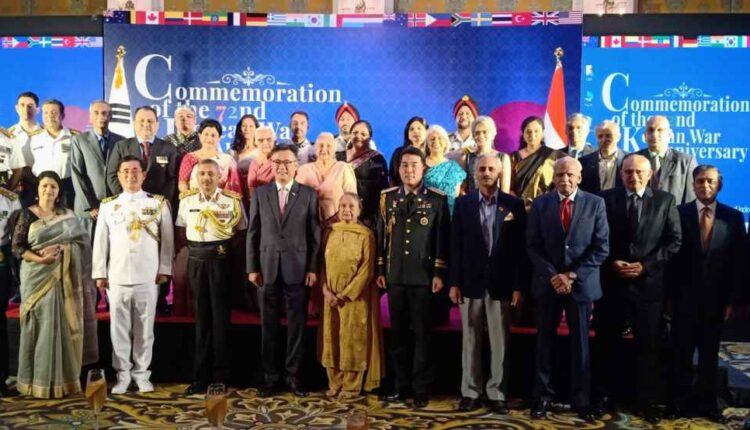Families of Korean War veterans taste drinks from Paju, where India’s 60 Para Field Ambulance Unit was in action
NEW DELHI: The commemoration event for the 72nd anniversary of the Korean War hosted by Ambassador Chang Jae-bok and the Korean War Veteran Association of India on June 24 at a hotel in New Delhi was very different this time.
Every year, families of the Army men who had participated in the Korean War in support of South Korea against North Korea in 1950-53 are invited by the Embassy of the Republic of Korea and are honored for the sacrifices made by the soldiers.
For the first time, the event offered the guests the Korean traditional liquor ‘Gam-hong-ro’ from Paju city of Gyeonggi-do province, the place where India’s 60 Para Field Ambulance Unit actively performed its medical support missions during Korean War in 1950-53. This Korean liquor revived the old memories and connected the families of the Korean war veterans to the fierce war.
Gam-hong-ro was originally produced in the Pyongyang area of modern-day North Korea, though since the Korean War production was interrupted. Later It was shifted to Gyeonggi-do, South Korea, an area where many Korean War refugees settled. It is also known for its high quality water.
The name gam-hongro is made of the words gam, meaning “sweet”, hong meaning “red” and ro meaning “dew”. The drink is made from local, non-glutinous millet, sticky sorghum and rice, using local yeast. It has a sweet taste and smooth aroma, with a lingering flavor in the mouth.
Not only that, the food served during the event was a mix of Indian and Korean cuisines.
Another newness of the event was the backdrop of the stage carried flags of all 22 nations that had fought war under the UN umbrella in support of South Korea against North Korea.
Another interesting feature of the event was the presence of Lt. Gen. B.S. Raju, Vice-Chief of Army Staff who attended the event as the Chief Guest. Incidentally, General Manoj Mukund Naravane who is the current Chief of Army Staff was invited to this event but he couldn’t make it because of some reasons.
Interestingly, Lt. Gen. Raju who represented General Naravane in the event happened to meet his old time friend and classmate Capt. Yong-seok Choi, Defence Attaché, Embassy of Republic of Korea.
Around 100 attendees including Ambassadors and Defence Attaches of the 22 Korean War participating countries, also attended the event.
In his address, Ambassador ROK Chang Jae-bok said that whenever he was with veterans and their families of the Korean War, proud memories of glorious services rendered by our heroes flash through my mind, evoking strong emotions. He also wished for good health of living Indian veterans of the Korean War Mathew Thomas, S.K. Sharma and Angad Singh.
“I express a warm welcome to all of you, and also extending my heartfelt gratitude to our heroes and their families on behalf of the people of the Republic of Korea. Today, we have prepared a delicious Korean meal and Korean drinks to express our deepest gratitude to our heroes, their families and their governments.”
72 years ago, the Republic of Korea had faced a devastating crisis with the invasion from communist forces, which led to a difficult and protracted war. Most of the country’s territories, including the capital of Seoul, were captured by the communist army.
However, the Korean people did not give up the freedom and democracy that we had so painstakingly fought for.
Ambassador said, “Without the courage of the these forces some 70 years ago, the Republic of Korea would not have been able to attain the prosperity as we see today. Without the sacrifice of these heroes nearly 70 years ago, there would have been no Samsung mobile phones, no LG refrigerators, no Hyundai/Kia automobiles, and no Squid Game and BTS.”
Not just that, India also played another important role for the process of armistice of the Korean War in 1953.
It sent C.F.I., Custodian Forces India, of around six thousand troops to supervise the exchange of prisoners-of-war. It took charge the Chair of the Neutral Nations Supervisory Repatriation Commission, and helped U.N. forces accelerate the process of the armistice.
Ambassador said that at the same time, India whole-heartedly welcomed some prisoners-of-war who did not want to go to South Korea or to North Korea, and decided to stay in the third country.
And these Koreans became the first Korean immigrants in India, paving the way for more Koreans to come to India.



